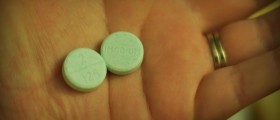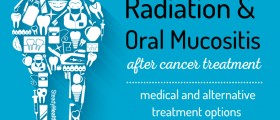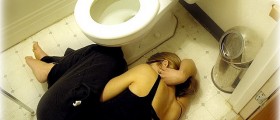
Due to the fact that acute gastroenteritis is self-limited most of the times, specific treatment may not be required. Only some cases, about 10 percent, require antibiotics.
Proper rehydration and electrolyte supplementation is the main goal. ORS - oral rehydration solution can be used, as well as intravenous solutions.
It is very important to pay strict attention to personal hygiene during this period.
In order to achieve oral rehydration, clear liquids, as well as glucose-containing and sodium-containing solutions can be used. The simplest oral rehydration solution can be made of four heaping teaspoons of sugar and one level one of salt, which are added to a quarter-gallon of water.
The proper use of ORS has changed the cholera mortality rate, from over 50 percent to less than1 percent.
ORS should also be used in other diarrheal diseases.
The World Health Organization (WHO) recommends a solution consisting of potassium chloride, sodium bicarbonate and sodium chloride. In cases of severe dehydration and persistent vomiting, intravenous solutions are required.
Absobents do not reduce the fluid loss or change the course of the disease, but they can help patients to control defecation to a certain level.
Aluminum hydroxide or Kaopectate can be used here.
There should be a 1-2 hour interval between taking absorbents and other medications.
Antisecretory agents should be useful.
Antiperistaltics (opiate derivatives) are not to be used in cases of bloody diarrhea, system toxicity, fever, or if the patient's condition deteriorates, or does not improve at all.
Diphenoxylate with atropine can be used in a form of a tablets or liquid. Loperamide (Imodium) decreases secretion and the motility of intestines and increases the absorption of water and electrolytes.
In cases that symptoms last longer than three or four days, stool cultures should be examined in a laboratory.
If the pathogen is isolated, specific treatment is required.
In cases of systemic or dysenteric symptoms, or if traveler's diarrhea is suspected, an empiric treatment is required. Agents that treat Campylobacter organisms and Shigella can be used with patients with myalgias, headache, vomiting, abdominal pain and fever.
TMP/SMX (Bactrim DS 1 tab qd) can be used as an alternative therapy, but resistant tropical organisms can be treated with doxycycline or fluoroquinolone. Antibiotics should not be used in cases with absence of dysentery, before Escherichia coli is ruled out.
It is advised to avoid foods with lactose, such as dairy products like milk, during acute diarrhea episodes.
The prevention of complications and reduction of morbidity is the goal of pharmacotherapy.
Supplementation of electrolytes and proper rehydration is the primary goal. In order to do this, ORS intravenous solutions can be used.







_f_280x120.jpg)









Your thoughts on this
Loading...